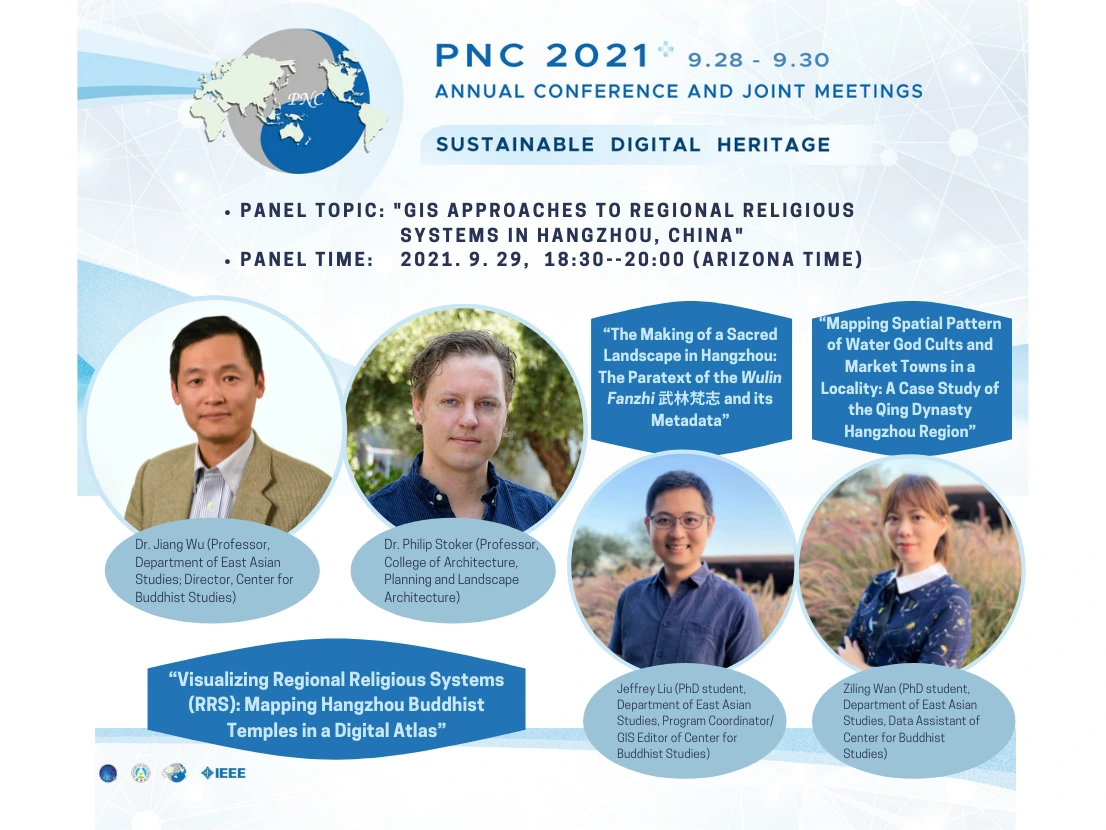
Special GIS Panel on Hangzhou Buddhism at PNC Annual Conference
We are happy to announce that we are invited to present our grant-winning project (awarded by College of Architecture, Planning & Landscape Architecture, see https://cbs.arizona.edu/news/mapping-buddhist-temples-grant) at Pacific Neighborhood Consortium (PNC) annual conference hosted by Academia Sinica, Taiwan. Two students who are also involved in the project will present their own research, with GIS approaches to Hangzhou Buddhism.
The invited presenters include Dr. Jiang Wu (Professor of Department of East Asian Studies and the Director of the Center for Buddhist Studies), Dr. Philip Stoker (Professor of Landscape and Architecture Planning), Jeffrey Liu (PhD student, Department of East Asian Studies, Program Coordinator/ GIS editor for Center for Buddhist Studies), and Ziling Wan (PhD student, Department of East Asian Studies).
Panel time: Sep 29, 18:30--20:00 (Arizona time)
Sep 29, 21:30--21:30 (New York time)
Sep 30, 09:30--11:00 (Taipei/Shanghai time)
Sep 30, 10:30--12:00 (Tokyo time)
Please register online at: https://sites.google.com/view/pnc2021
Conference Title:
PNC 2021 Annual Conference and Joint Meetings: Sustainable Digital Heritage
Conference Description:
It is our great pleasure to announce that the PNC 2021 Annual Conference and Joint Meetings (PNC 2021) will be held in Academia Sinica, Taiwan from September 28th-30th, 2021, accompanied by online access to a virtual version of the conference. The main theme of the PNC 2021 is "Sustainable Digital Heritage." The PNC 2021 serves as an opportunity for researchers and developers to facilitate information exchanges among institutions of higher education in the Pacific Rim through computing and communications technology. PNC explores issues of information and technology exchange, interdisciplinary collaboration, and the development of the cultural knowledge contents. The technical program of PNC 2021 will include invited keynote, paper presentations, workshops, and poster sessions.
Panel Topic: GIS Approaches to Regional Religious Systems in Hangzhou, China
Panel Time: Sep 29, 18:30--20:00 (Arizona time)
Panel Description:
The Hangzhou area is one of the major cultural and economic regions in China. Buddhism, Daoism, and popular religions have flourished there since the tenth century and continue to exert enormous influence over the Jiangnan area and beyond. Despite its importance, there is so far no systematic effort to survey the Hangzhou religious culture in a quantifiable approach such as using the GIS mapping technology. In this session, we will introduce the Hangzhou Regional Religious Systems mapping project at the University of Arizona and showcase some of the initial results in our research. The four panelists will explore the concept and method of the project such as Regional Religious Systems (RRS), mapping techniques, issues in the source materials, and the distribution pattern of local gods in market towns, etc.
Presenters & Title:
Dr. Jiang Wu & Dr. Philip Stoker:
Visualizing Regional Religious Systems (RRS): Mapping Hangzhou Buddhist Temples in a Digital Atlas
Jeffrey Liu:
The Making of a Sacred Landscape in Hangzhou: The Paratext of the Wulin Fanzhi 武林梵志 and its Metadata
Ziling Wan:
Mapping Spatial Pattern of Water God Cults and Market Towns in a Locality: A Case Study of the Qing Dynasty Hangzhou Region

